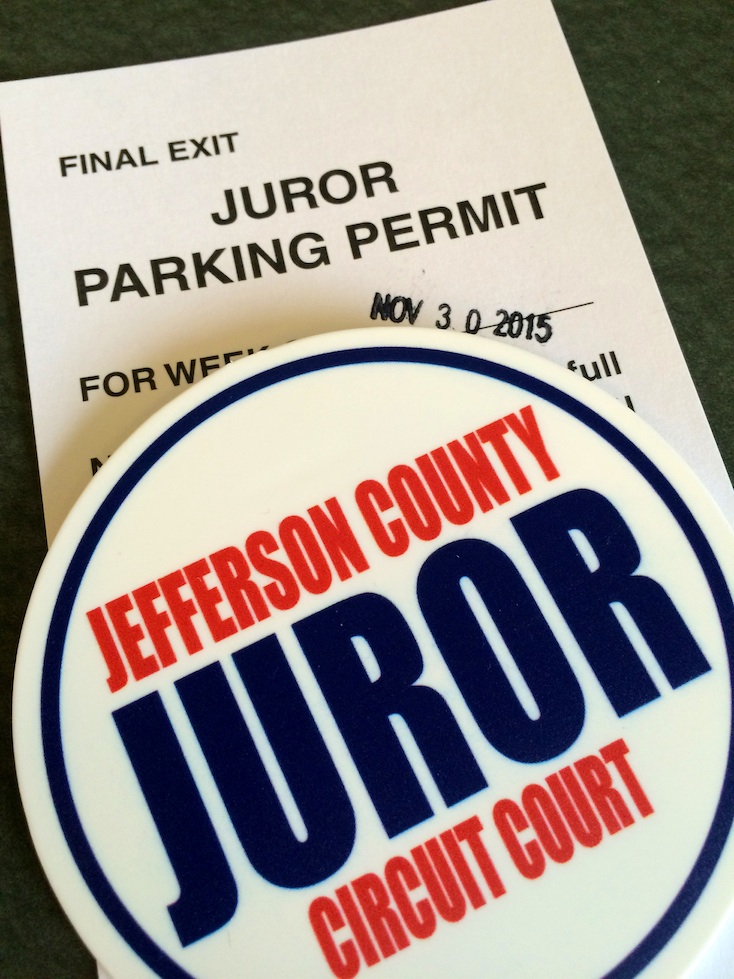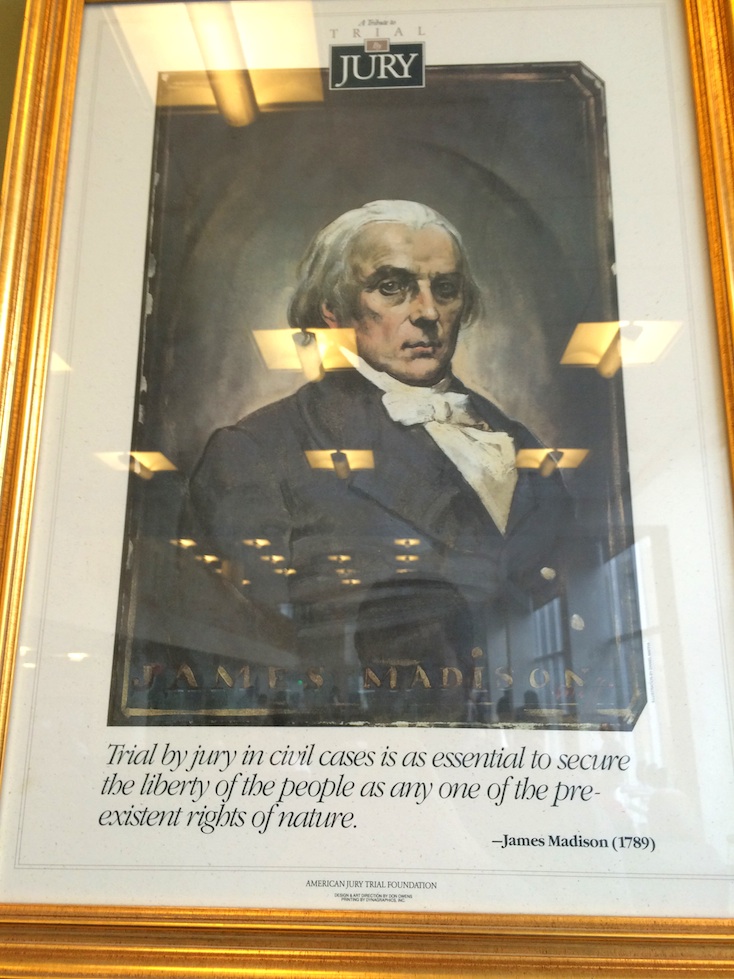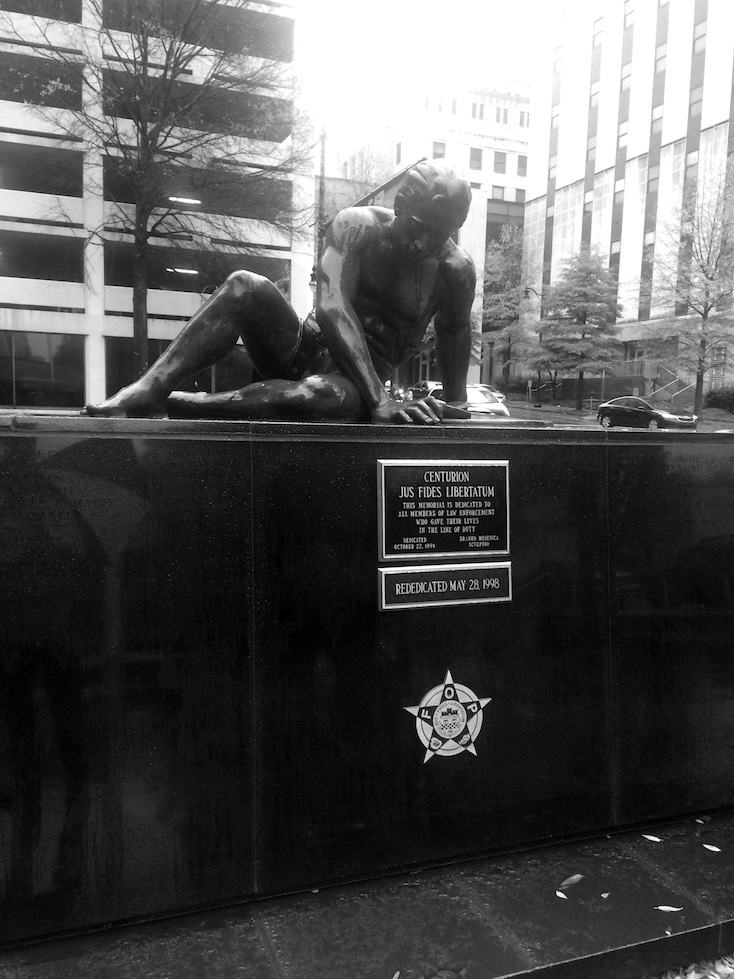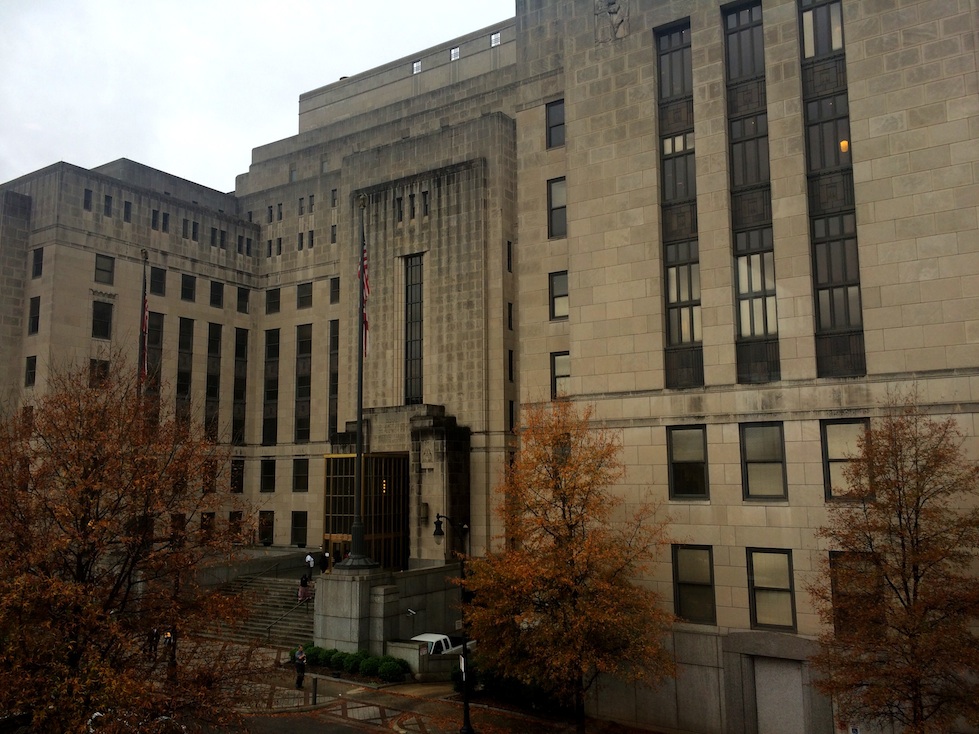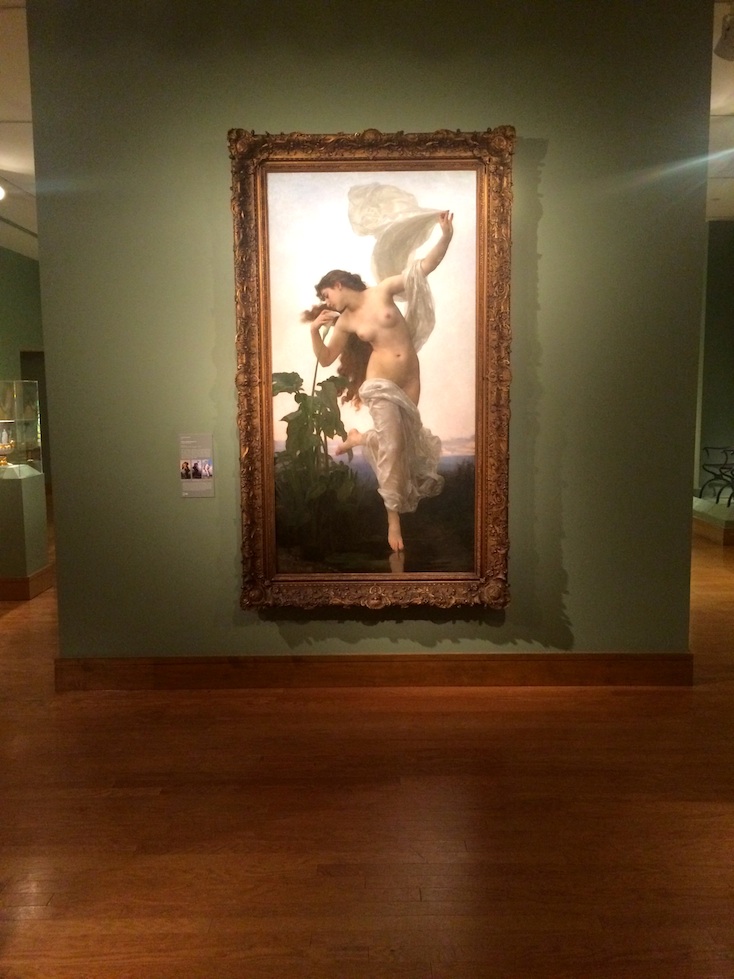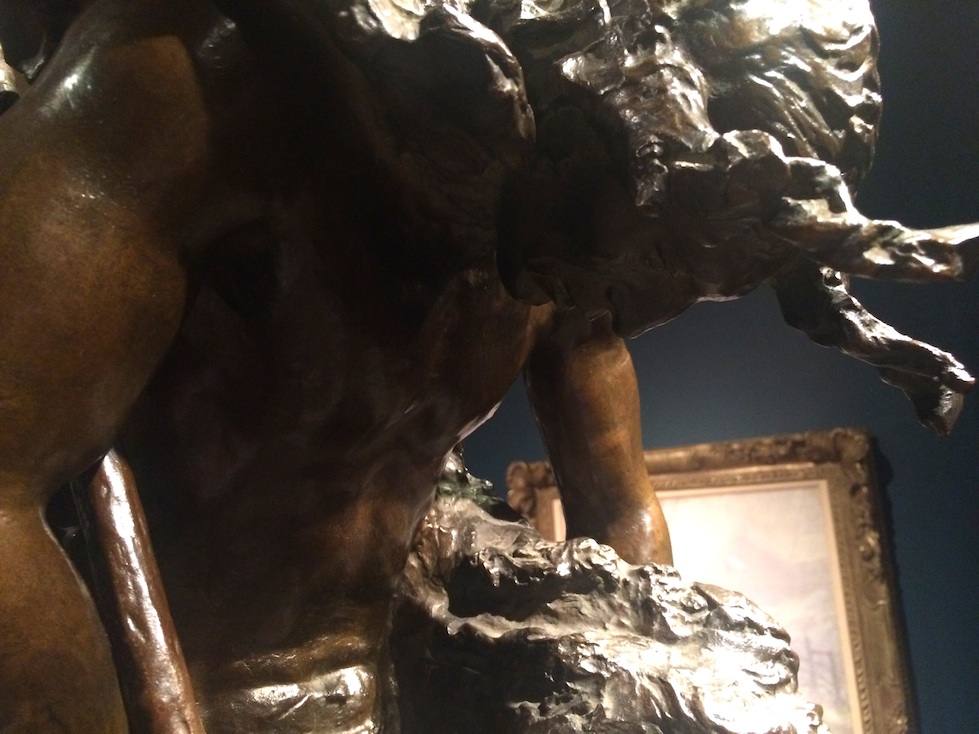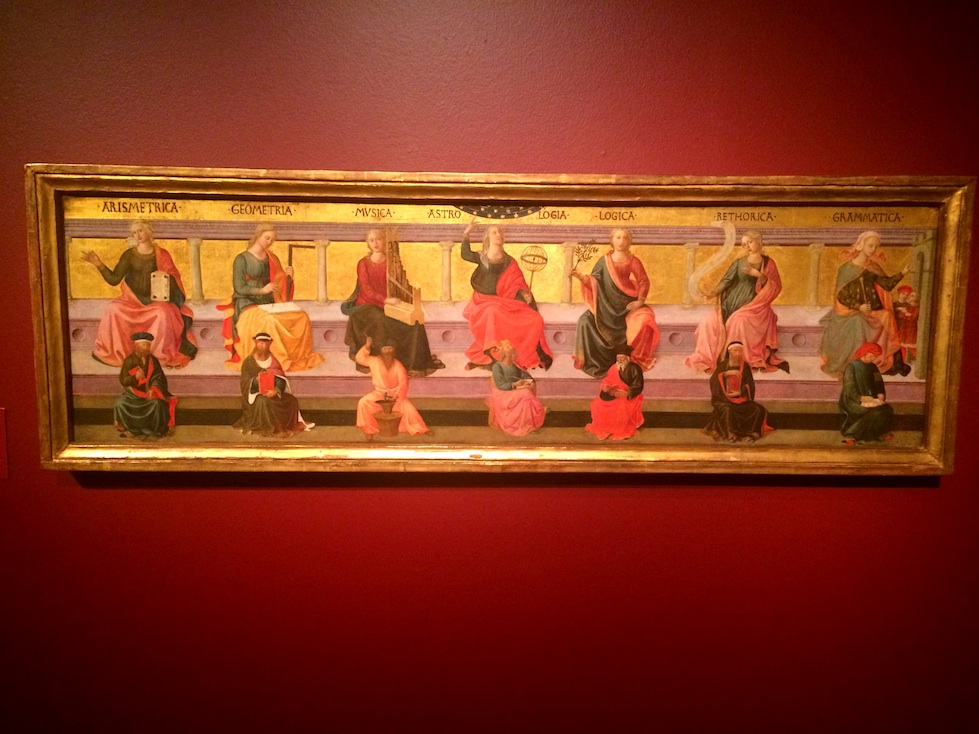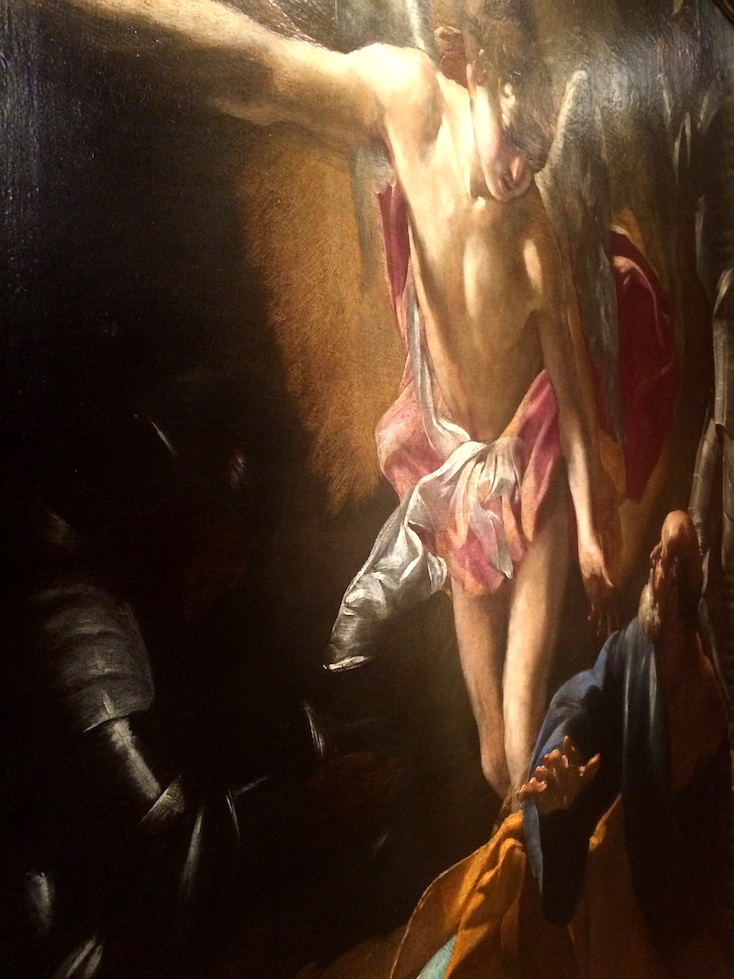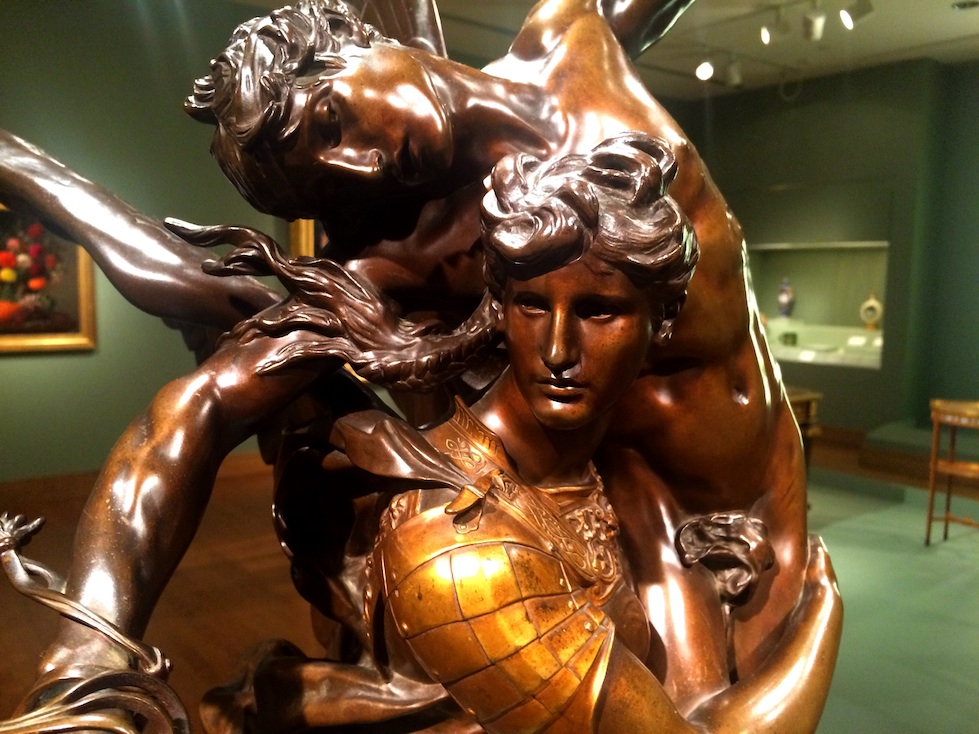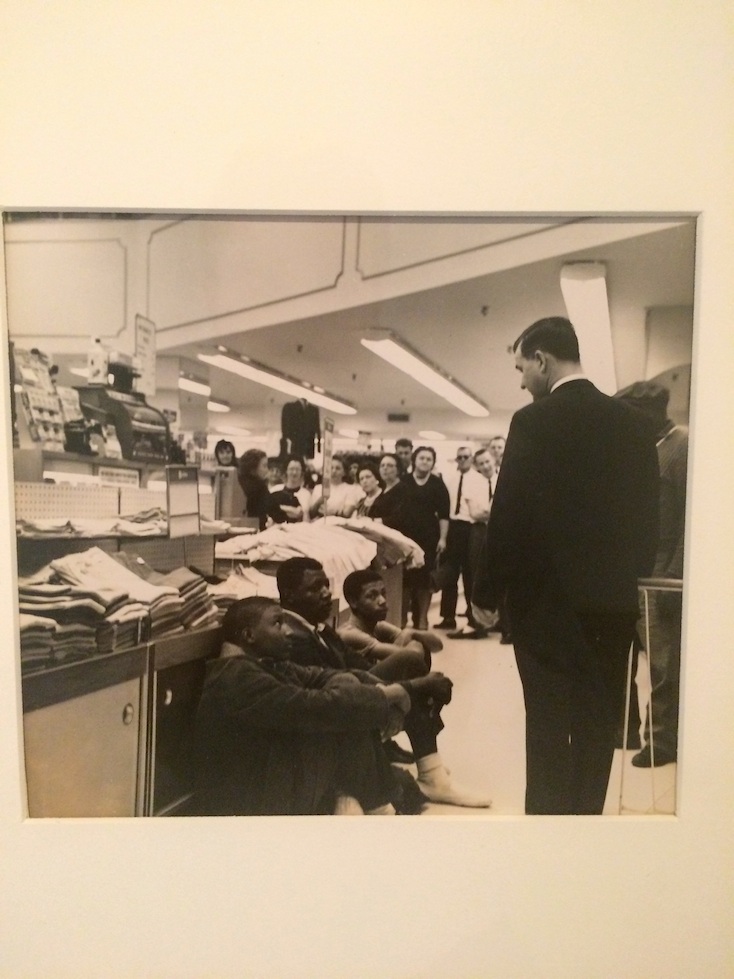A couple of weeks ago I received a summons to serve as a juror. My first one ever. Lawyers usually don’t like jury duty because we almost always get struck. It’s a waste of our time. But as I’m not one to shy away from my civic duty, I committed to seeing the experience through. I documented my experience in real time (to a limited extent) on Twitter and Facebook. Here is my full account. All names have been changed.
Jury Service Day 1
I wake up, knowing that I am going to spend the day in a courthouse, but not wearing a suit. This will be the first time I have not worn a suit while in a courthouse in at least 6 or 7 years.
Breakfast, coffee, emails, then out the door. Usual 8am traffic and commute.
Get to courthouse. A court employee directs me into the parking deck attached to the courthouse. There must be a dozen cars both in front and behind me. Floor by floor, the deck is full. Get to the top – another court employee directing people towards the down ramp and back out of the parking deck.
Back down to the street. The first court employee is still directing people into deck. Just making people drive through it…for reasons…before having to go to the alternate deck two blocks away.
Your tax dollars at work. Jury service not off to an auspicious start.
Park in the alternate deck on the other side of the park away from the courthouse. Take leisurely stroll through park. Narrowly avoid being accosted by homeless for change. I don’t have cash on me anyway.
Make my way into jury pool room, across the street from the courthouse. Jury pool assembly room chairs and carpets look like they’re from the 1980s. Pictures hung askew on walls.
Get a seat in the back next to the power outlets. First outlet plug I tried didn’t work of course. Jury room has wi-fi…it’s either overloaded or broken.
I sit around waiting for another fifteen minutes before the presiding judge comes in with a couple of other judges. Presiding judge gives a speech on the importance of jury service. But also notes that the courts are strapped for funding. Asks jurors to waive their $750 a week.
“Haha. Just kidding. This must be the first time for a lot of you. You only get $10 a day.”
I laugh. All lawyers know that you have to laugh when a judge makes a joke. The jokes usually aren’t funny, but we laugh anyway. None of the other jurors laugh. I stop quickly.
Judge now explaining the 6th amendment. Doing a pretty good job making it clear for non-lawyers. Onto 7th amendment. “Hot coffee” case gets a mention. Amazing the staying power that case has. Permanently etched into public consciousnesss. Good job defense lawyers and insurance companies.
Judge explains that December is a tough month for jury pools. Many skip it. Only around 200 jurors potential jurors show up. There are 11 trials this week. This means if assigned to a jury and struck, we’ll have to come back to try to be a juror again in the main pool. Fantastic.
We swear in.
Presiding judge excuses himself. One of the other judges (circuit civil) explains some rules and discusses exemptions and excuses from service. I know this judge casually. Sitting here, it occurs to me that I think we’re actually friends on Facebook. I check, we are. I’m Facebook friends with a couple of other sitting judges as well.
Thought comes to mind: Do I have an ethical duty to disclose a social media connection if I’m selected to be on a jury in her courtroom? Does the judge have a duty to disclose? I pose the question on Twitter & Facebook. Here is a sample of the responses:
@associatesmind I wouldn’t be very concerned about having to disclosed. You will get asked.
— Alan Duke (@wadukejr) November 30, 2015
@associatesmind If you have to ask, the answer is yes. — Popehat (@Popehat) November 30, 2015
@associatesmind makes it easier for judge to see if you’ve violated instructions to not use social media re: case if you’re on jury.
— Bjartur Summerhouses (@remote_orb) November 30, 2015
@associatesmind This is one of several reasons I don’t friend judges on Facebook. Prosecutors, though… — Leo M Mulvihill, Jr (@FishtownLawyer) November 30, 2015
@associatesmind probably not. But Facebook gives you direct, private access to the judge so I think he/she has to disclose
— Will Small (@WillSmall09) November 30, 2015
This is why I have a political fan page, which folks can “like”—https://t.co/5qzPNVYrmI—but there’s no “friending.” https://t.co/VyX3Oem1OV — Justice Don Willett (@JusticeWillett) November 30, 2015
“I know this judge from various online interactions.” “How so?” “Tinder.” https://t.co/fl7hwkp26o
— Eric L. Mayer (@ericlmayer) November 30, 2015
Nice.
On the one hand, social media is often overrated. It’s lauded to the rafters. People like to claim it does all sorts of things but most of the time it doesn’t actually achieve much. On the other hand, it’s kept me entertained this morning while I’ve discussed ethics with a dozen lawyers (& Justice) in as many states this morning.
So, it can be pretty cool.
Judges leave. Court Administrator is up, explaining details, emergency numbers, parking passes, etc. Also, free advertising for hot dog stand lady. 2 dogs, chips, & a drink for $5. Cash only. Juror Special.
“We want to get you out of here as fast as you want to go home.” Way to sell the jury experience.
All procedural matters covered, we’re given a twenty minute break. Freedom.
Back in the juror room. I sit below a picture of Madison.
Nice sentiments. If polled, I wonder how many in this room would know who Madison is.
Lots of waiting involved with jury duty. Everyone is bored. 85% on electronic devices of some type. 10% reading books/newspaper. 5% asleep.
Some conversations starting up between people. Already overhearing a couple people starting in on the “how can lawyers defend that type of person!” It must be tough to be a criminal defense attorney.
Also, all the personal injury tv lawyers in the state getting discussed by name. Want the jury pool to know who you are as a lawyer? Buy tv ads.
Check back on Facebook. A criminal defense lawyer I’m friends with tells me they have a trial this week. I’m never actually going to make it to a jury.
Waiting…waiting…
I’m going to guess that we get let out for lunch before anything even happens.
Sitting in a jury pool waiting room feels a lot like sitting in the waiting room of a dentist’s office. Sure you could try and work or read or whatever. But in the back of your mind there is this anticipation. At some point you know you’re going to be called in and have your teeth drilled.
Lunch.
Back from lunch. Still waiting.
1st group or jurors being called…I’m not picked.
2nd group being called…I’m in. All devices have to be switched off. I tell Twitter and Facebook that I’ll catch them on the flip side.
We walk across the street to the criminal courthouse. The Jefferson County Jail is right next to it. The statue out front is for police officers who gave their lives in the line of duty, but never fails to evoke dark images. The Civil Rights movement. Police dogs and fire hoses. A Letter From A Birmingham Jail. Not the same jail, yet the weight of history remains tangible.
Walking into the courthouse, I run into a lawyer I know. “I’ve been following your jury updates on Facebook! Hilarious!”
I’m never going to actually make it to a jury. We chat for a minute about lawyers serving on juries before I have to go through security.
This is also the first time it is revealed to the other jurors (at least those who overhear our conversation) that I am a lawyer. They’re looking at me askance. I’m an enemy combatant who managed to infiltrate their group. I’m not to be trusted.
We are arranged outside of the courtroom by the bailiff. “Stay in order, stay in line.”
Finally we’re instructed into the courtroom.
The defendant is a woman…I know her defense lawyer. We’re friends on Facebook! My stupid, hypothetical ethics question from earlier comes back to bite me in the ass!
Actually, hilariously, the lawyer is an adjunct at the law school I attended – he taught me criminal procedure!
Again, I’m never actually going to sit on a jury.
Walking to the jury box, the defense lawyer and I nod to each other. I try to maintain a straight face.
The judge on the case, Judge Black, is well thought of and respected. He’s been on the bench for over 15 years. He’s what your mind’s eye conjures when you hear “southern judge” – old, white, deceptively intelligent. Fill in the rest.
Judge Black swears us in again and covers the basics of voir dire. He never actually says voir dire, he only ever says jury selection. Latin largely banished from the courtroom.
The judge reads over the accusations. Assault, destruction of property. But in conjunction with a relationship so it’s also bumped up to domestic violence (DV), second degree. Judge Black points out that the defendant is a woman and the alleged victim is a man and takes time to note that this is a role reversal from what people usually expect in DV cases. Again, we’re in the South.
Judge Black begins to ask the potential jurors questions.
“Does anyone have a moral or religious reason why they cannot sit in judgement of their fellow man or woman? Does everyone understand and speak the English language? Is everyone a citizen? Over 19? Has anyone been convicted of a crime of moral turpitude?” (I love that this phrase still gets used in Alabama.)
“Is anyone, by blood or by marriage, related to the prosecutor? The Defendant? Defense counsel? The Accused?”
“Does anyone know prosecutor? The Defendant? Defense counsel? The Accused?”
I raise my hand.
“Aha,” says Judge Black. “Mr. Lee is it?”
“Yes your honor,” I stand and reply.
“How do you know defense counsel?”
“He was my criminal procedure professor in law school. I also see him at bar association events around the city.”
The prosecutor cocks her head, gives me a smirk, and makes a check on the jury selection page in front of her. I don’t need to see it to know that she struck me. I don’t bother mentioning the Facebook thing.
“Well Mr. Lee,” the judge says, “That’s not going to affect you being a fair and impartial juror in this case is it?”
“No your honor,” I say.
“All right, well let’s continue. Be seated.”
I sit. I’ll be forced to stay through the jury selection process even though everyone knows I’m not actually going to make it through.
The questions wrapped up, the judge instructs the prosecutor to begin: “You may begin Mrs. Jones.”
The prosecutor is methodical, but friendly. A young woman, she looks to be six or seven months pregnant. Great advantage. Most people are sympathetic and deferential to pregnant women (especially in the South).
She begins to discuss reasonable doubt. What that means. How we can know what it is. Eventually she points out a flag in the corner of the courtroom.
“What flag is that?” she asks.
“The American flag,” comes a few scattered responses.
“Again, everyone please. What flag is that?” she asks again.
“The American flag,” replies the chorus.
“How many stars does the American flag have on it?”
“Fifty.”
“What are the colors on the American flag?”
“Red, white, and blue.”
“How many stripes are on the American flag?”
“Thirteen,” though only about half of the jurors respond.
“Good, everyone remembers what they learned in middle school!” says the prosecutor, “Now, have any of you actually had a chance to examine the flag?”
A scattered “No” from the jurors.
“Have any of you counted the star on the flag? Or the stripes? No. But you can look at the flag, see the evidence before you, and know beyond a reasonable doubt that that’s the American flag. That’s what I’m going to ask of you in this trial. You don’t need absolute proof, just beyond a reasonable doubt that the accused is guilty of her crime.”
“You’re going to hear from witnesses and see evidence in this case that will prove that the defendant is guilty beyond a reasonable doubt. That she is a woman has no bearing on the matter.”
The prosecutor goes on to ask general questions to the jury pool. Has anyone given to charities for women who are victims of domestic violence and so on. Trying to feel out the jurors’ sympathies. After about ten more minutes she wraps up.
The judge looks at the defense lawyer: “Go ahead Robert.”
It’s a subtle difference and I wonder if any of the other jurors catch it. The prosecutor is “Mrs. Jones,” but the judge is on a first name basis with the defense lawyer. Robert has been a lawyer for nearly thirty years. He’s probably been in front of Judge Black dozens of times.
Robert is eccentric. Colorful. White/gray hair longer than conventional, but not too long to attract attention in the South. Always well dressed. Nice cuff links. He steps to the podium, collects himself for a moment.
“The only thing that the American flag has to do with this case, ” he says pointing at the flag in the corner, “is that it guarantees that everyone in this room, including the defendant, is presumed innocent!” Whereas the prosecutor was methodical and calm, Robert immediately strokes the fire.
“Let me ask all of you a question: Aren’t we all taught at a young age – by our grandparents, our mother, our father. That you. Do. Not. Hit. A. Woman,” he says striding away from the podium and emphasizing each word while pointing at the ground. “Don’t we all learn that?” Nods from the jury.
I lock eyes with the prosecutor, she rolls her eyes slightly. I try to contain a smile and cover my mouth with my hand. She does the same and looks away. Robert continues.
“And doesn’t a woman have a right to defend herself?” he says, his voice rising. “We all agree to that right? It’s the 21st century. Women don’t have to just sit there and take abuse.” More nods and murmurs from the jury.
“Judge I have to object to this -” the prosecutor says with an exasperated sigh.
“Overruled,” Judge Black says before she can even get going, “Continue.”
“That’s right. The defendant has every right to her defend herself. And she has no duty to prove that she is innocent. She is presumed innocent,” Robert says, his voice rising again.
“And the prosecution,” he continues, pointing at Mrs. Jones, “has the burden of proving otherwise! The defendant has nothing to prove. She. Is. Innocent. The burden is totally on the prosecutor.” He pauses, taking a moment to look around the room, looking at every juror. “I’m done. Thank you your honor.”
“All right,” Judge Black says, “How much time do you need for selection?”
“Twenty minutes?” Robert says, looking at Mrs. Jones. She nods in agreement.
“All right everyone, please go have a seat in the jury room or you can stay in your seats here.”
I head into the jury room. Twenty minutes of cooling my heels before I can get out of here. Another juror, a middle aged lady, comes up to me and asks if I’m a lawyer. I tell her I am. She tells me her daughter graduated from undergrad a year ago and is currently getting her CPA license, but wants to go to law school afterwards. What were my thoughts or advice? I’ve got my spiel down to an exact science at this point.
I tell the woman that she should discourage her daughter from going to law school. She’s better off being a CPA. It’s as tough as it’s ever been to be a lawyer. Too many law schools and lawyers. Non-dischargeable student loan debt. Not enough jobs. Industry in flux and shrinking. Automation and technology changing how law is practiced. I wrote a book on becoming a lawyer, published by the ABA. The first chapter is entitled, “Do Not Go To Law School.”
I tell the woman that the only way her daughter should go to law school is if she knows what it means to be a lawyer. Has worked in a lawyer’s office. Really wants to practice law, not just defer adulthood by another three years. We’re called back into the courtroom. I give the woman my card and tell her that her daughter can email or call me if she wants. Most people never do.
We sit back down. Mrs. Jones and Robert begin to strike the jury. Numbers are used so that the remaining jurors don’t know which side struck which juror. It takes maybe five minutes. Afterwards, Judge Black reels off the names of the jurors who were struck. I’m third on the list.
“Well I have some good news and some bad news,” Judge Black says. “The good news is that you’re done for the day and can go home. The bad news is that the chief judge tells me that we still need you for the pool. So report back to the main room tomorrow morning at the same time. Thank you, you’re dismissed.”
Day 1 of jury duty in the bag.
Jury Duty Day 2
Reported to jury pool at 8:30am as instructed…45 minutes later everyone still just sitting here. No announcement, no welcome to Day 2.
It’s raining.
Still just sitting around waiting in the pool area. The vending machine is out of bottled water. First world problems.
An hour and a half after everyone arrived, we hear the first words of the day from the court administrator: “I’m looking for Sam Smith.” No response. Court administrator sits back down.
Yesterday was a friendly introduction to jury duty. Today is you’re stuck here just like us.
Now a couple of people next to me are getting into the politics of a state lottery in Alabama. It’s been brought up a few times as a ballot measure but is never approved. A lottery is likely too close to a “crime of moral turpitude.”
Of course, all almost all the states surrounding Alabama have lotteries. The running joke is that Alabama citizens have probably paid for the education of 10-20% of students in Mississippi, Tennessee, Georgia, and Florida. [Edit: multiple people pointed out that Mississippi has no lottery. Stop emailing me.]
Finally calling the first group of jurors. No fanfare. Just straight to calling names. Criminal trial. I’m not picked. Just as well, I saw three criminal defense lawyers I know walking into the criminal courthouse when I arrived.
If I go 2 for 2 being assigned to juries where I’m friends with the defense lawyers, the universe is telling me I’m not meant to serve. I’m going to tell the court administrator to just kick me out of here if that happens.
Back to waiting. Still nothing happening. No way we’re called before lunch. Let us out. LET US OUT.
I overhear an elementary teacher talking with another juror. The teacher has her laptop up. On the screen is a grid of images. They seem to be showing snapshots of computer desktop screens. The teacher explains that the students in her class have school-provided Chromebooks. Software on the Chromebooks allows her to pull up their desktops from anywhere and observe what they’re doing in real time.
“This will be funny,” she says as she pulls out her phone. She’s calling her substitute teacher. “Tell Bobby Monroe to stop looking up Raiders jerseys and do the assignment.” The teacher shares a laugh with the substitute and closes her phone.
INDOCTRINATION BEGINS NOW CITIZENS. THE PANOPTICON IS REAL. YOU ARE ALWAYS BEING WATCHED. WE ALWAYS KNOW YOUR ACTIONS.
ALL OF YOU HAVE LOVED ONES. ALL CAN BE RETURNED. ALL CAN BE TAKEN AWAY. OBEY OUR INSTRUCTIONS AT ALL TIMES.
I’m beyond bored and begin to clean out my laptop bag.
Finally we break for lunch. I go to the café at the museum a block away.
Back to the jury pool room on time from lunch break. Court administrators indifferent and unaware. I probably could have been 15 minutes late. Rebellious.
An hour goes by. Another group is called. I’m not in it. It’s a bit past two in the afternoon. I doubt I’m going to be called at this point. If the chairs were the least bit comfortable I would take a nap.
Another hour goes by.
Without any fanfare the Court Administrator announces: “Y’all are done. Your jury service for 2015 is completed.”
Jury duty ends with a whimper. Anti-climactic.
I walk to my car and begin wheeling out of the parking deck. I think back on the past two days.
It was long. It was dull. No one really seemed to be happy to be there. They all felt it was a hassle or should be modernized. “Couldn’t we just get those pager things like they have at restaurants?”
But everyone I spoke to also felt they needed to be there. They were glad to contribute. “If I needed a jury, I’d want people to show up so…” Despite our fragmented society and micro-niche cultures, everyone still felt a compulsion to do their duty to society, to be a part of the clunking justice machine as it trudged forwards.
I don’t have any grand epiphany or surprising takeaway. The system is old. It creaks at the seams. But it works. Citizens come in and take their role in the great play. It’s a minor role, but it reminds them that they’re part of something greater.
And they still want to be part of it.
That’s something at least.

